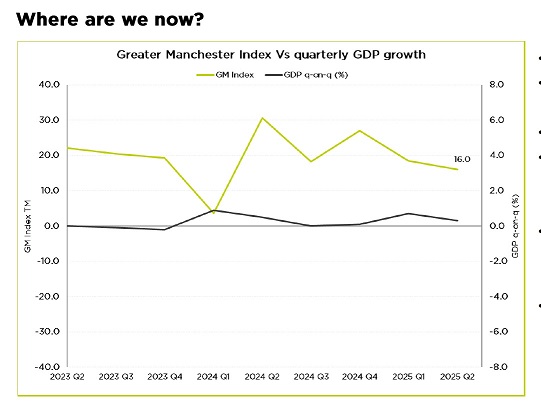
The results of Greater Manchester Chamber of Commerce’s latest Quarterly Economic Survey (QES) highlight the impact global uncertainty and rising costs are having on businesses.
The QES shows the Greater Manchester economy, like the UK economy, continues to be volatile as businesses deal with issues such as US tariffs and increases in Employer National Insurance contributions. While the service sector continues to perform better than the manufacturing sector, there are concerns growth is being driven more by increases in public spending than business investment.
The results were revealed to business leaders on 25th June at the Q2 Economic Review by Subrahmaniam Krishnan-Harihara, the Chamber’s Deputy Director of Research.
GM Index™ Falls
Subrahmaniam explained that the GM Index™ (a composite economic indicator created from QES data) was down 2.5 points to 16 (in the previous quarter the Index had fallen nine points to 18.5).
He said: “While this is not as dramatic a reduction as last quarter it reflects the volatility and uncertainty that have characterised the UK economy for some time. We have seen bursts of growth followed by drops in production. There are persistent inflationary pressures meaning businesses will have to put prices up or reduce their margins.”
Manufacturing and Services
He added that the manufacturing sector had been volatile for several quarters, with two quarters of growth followed by a sharp reduction. There had been a 45 percentage points drop in performance in Greater Manchester and, although the number of respondents was smaller than usual, this was reflected by figures from across the North West. Business confidence in turnover had fallen in the manufacturing sector, which could lead to further price rises and the outlook was uncertain.
The QES showed the service sector was performing well with growth in the business to consumer and business to business sectors, but hospitality was struggling.
Subrahmaniam said: “In construction there has been a degree of reduction but there is a strong pipeline, and it will bounce back with a national target of building 1.5 million homes, which is 75,000 in Greater Manchester alone. This would mean 15,000 houses a year being built in Manchester, when the figure is usually 6,000 a year, so there needs to be a significant increase in housebuilding.
“The growth in the service sector is being fuelled by an increase in public spending in areas such as health and social care rather than business investment, which is a cause for concern. The growth in construction is coming through the building of schools, hospitals and colleges, therefore public spending is fuelling that as well. The rise in defence spending should mean that public spending will continue to fuel growth.”
Global Economy
As expected, the QES found international trade had been hit by the changing rules around tariffs which meant businesses were unable to plan. Subrahmaniam said ships laden with goods from China had been en route to the USA with importers having no idea if those goods would be subject to tariffs. The uncertainty over tariffs had led to an increase in manufacturing activity towards the end of the last quarter followed by a sharp drop, suggesting businesses had been rushing to get their goods out before the tariffs came into force.
“We now have a little bit of stability following the UK’s negotiation with the US over tariffs,” he said. “The manufacturing sector most affected by tariffs was automotive whereas food manufacturing did improve.”
Recruitment
The QES showed the rise in employer National Insurance contributions was having an impact on recruitment. National figures had already shown a significant reduction in employment with the number of workers falling from 30.5m to 30.1m over the last year. Despite a lower number of vacancies, some jobs were still not being filled which Subrahmaniam attributed to the “skills mismatch continuing to be a significant problem in the UK.”
Looking to the future, Subrahmaniam said the UK economy was predicted to grow by 1 to 1.2% this year. He highlighted the infrastructure announcements in the Comprehensive Spending Review but warned they could lead to higher taxes.
You can read the QES report here.

